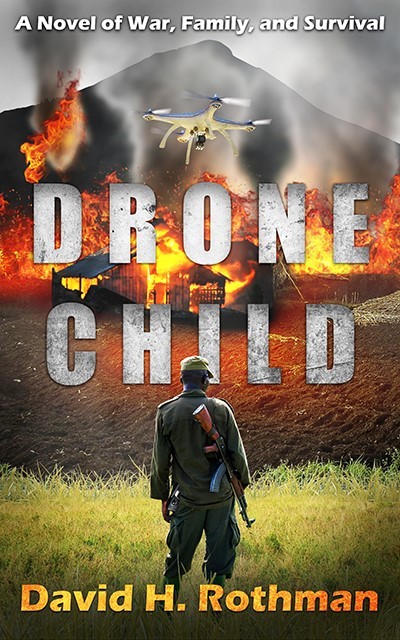Book Review: Drone Child: A Novel of War, Family, and Survival
Read an Excerpt from Drone Child: A Novel of War, Family, and Survival
Reviewed by:
Denolyn CarrollWhere does one begin to speak of atrocities so heinous that the telling itself is hauntingly vicious? David H. Rothman jumps right in. Drone Child opens with a focus on the day a 13-year-old boy named Mpasi is forcibly inducted into the so-called Congolese Purification Army and given his first order: to shoot his parents with an AK-47. Mpasi ultimately does so at his parents’ urging—“‘Kill us, Mpasi,’…’Better that they not kill us all.’” and at the threat of losing his own life. Then one of the soldiers kills his baby brothers as they cry in their dead mother’s arms.
Rothman is quick to clarify that the novel, set in a not-so-distant 2025 and beyond in Kinshasa, capital of the Democratic Republic of the Congo, “is far more about relationships than weapons and military strategy.” In the 22 short chapters of his “war memoir”—including “The Burning of Our Palace of Dreams,” “The Trade of Surviving,” “God’s Artillery,” and “Payback”—the author manages to highlight a sea of corruption and the predators that swim therein, and the nightmarish realities of child soldiers and sex slaves and the betrayals of trust that often breed them.
The reader sees much of this through the eyes of 15-year-old Lemba, a tech whiz whose skills allow him “to tinker with wires and printed circuit boards and software coding for video games…gadgets excited [him].” Following a raid on their village, Lemba and his twin sister, Josiane, decide to leave for Kinshasa. By doing so, they aim to keep their parents alive. As Lemba explains, “…’the best way to love you is to leave you. No kids around, you stay alive.’ In the worlds of both nightmares and reality, it was as simple as that.” And both Lemba and Josiane see the opportunity to pursue their own ambitions. But as the siblings explore possibilities in Kinshasa and begin to shine in their individual endeavors, they soon attract unwanted attention. For Lemba, it’s the interest of the dreaded Purifiers, who see his skills with computers and drones as a potential benefit to their army.
Lemba is kidnapped and drafted into the Congolese Purification Army. He notes the irony, “I’d fled to Kinshasa, only to fall into the hands of the people whose cruelty I was trying to escape.” And so begins his journey with a murderous group of miscreants—led by a deranged general called Demon Killer—who see themselves “as God’s agents, reclaiming everything stolen by the thieves of Kinshasa! Minerals! Money! Our dignity!” Lemba’s forced service requires him to become increasingly skilled at enhancing drones—referred to by Demon Killer as “God’s Little Airplanes”—for use as weapons in gross assaults on the “enemy.” But while Lemba marks his time in the army, always with an eye on escaping, Josiane is taken as a sex slave. Lemba and Josiane’s horrifying experiences spotlight only the tip of such global horrors that run deep and wide. Yet Rothman ends this fiction-based-on facts “memoir” with a twist of fate that breathes some light and hope into a seemingly ever-darkening world of despair.
The author manages to address a number of angles in the novel, while maintaining an intriguing storyline. The writing is rich and evocative. For example, at the end of Chapter 1 (“The Deaths of Papa and Mama Boule-boule”) he writes, “And so all the others died while Mpasi lived. How could that not have changed him? I would like to think he was born without the slightest touch of evil. But sometimes it happens accidentally, like a boulder rolling down a hill to crush you when you’re just walking by.”
Complete with a “Discussion Guide,” Drone Child is at once a novel and a teaching tool. In his “Author’s Note,” Rothman outlines his approach to this work, his perspectives, the fabrications, the facts, his research methods, and his reasons for taking on this narrative—a hefty tapestry interwoven with the possibilities for change. In the context of our current times, this is a hope worth having.

